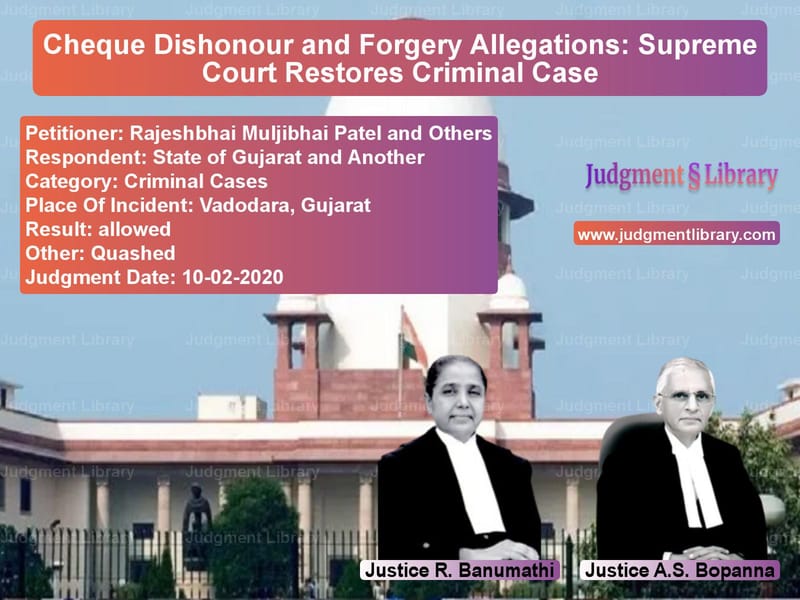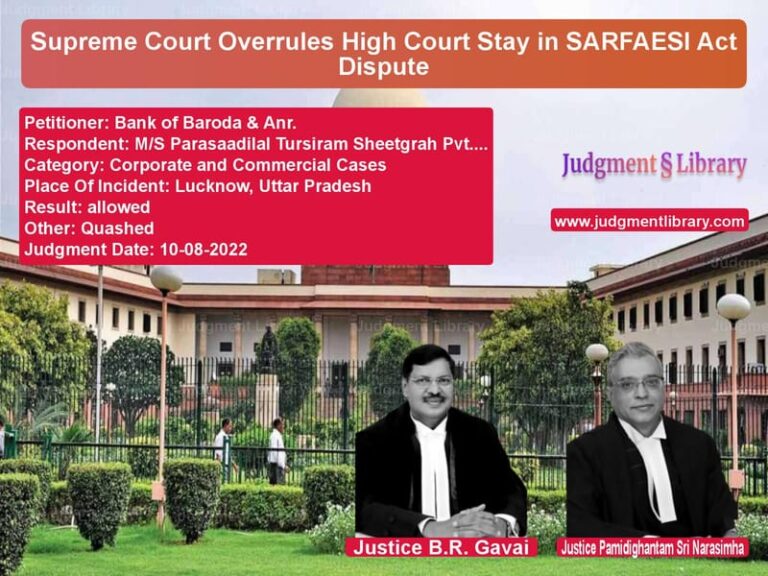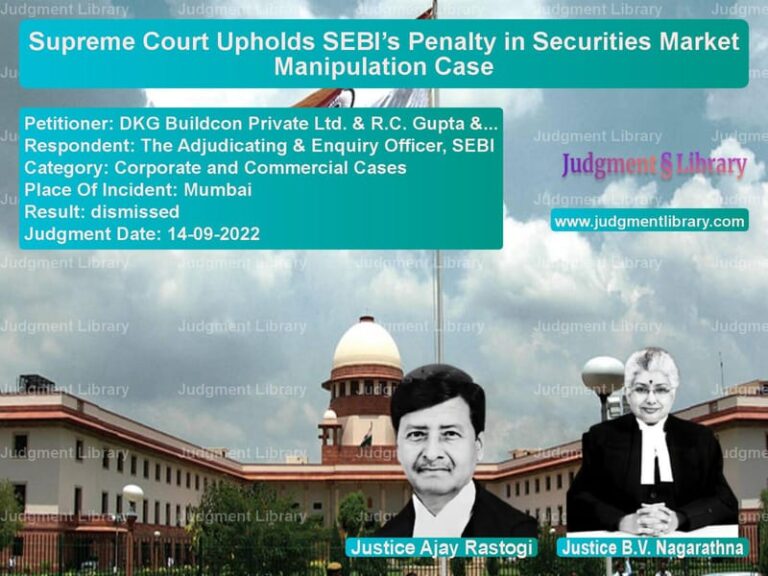Cheque Dishonour and Forgery Allegations: Supreme Court Restores Criminal Case
The Supreme Court of India, in its judgment dated 10 February 2020, dealt with a significant legal dispute involving allegations of cheque dishonour and forgery in relation to a land transaction. The case centered around a financial agreement between close family members and business associates, leading to multiple legal proceedings in both civil and criminal jurisdictions.
The case involved appellant No.1, Rajeshbhai Muljibhai Patel, and his brother, Yogeshbhai Muljibhai Patel, both residing in the United Kingdom. They were engaged in a financial transaction involving the sale of land, where substantial amounts of money were exchanged, allegedly in anticipation of a formal transfer of property ownership. However, as events unfolded, disputes arose regarding the legitimacy of financial claims, leading to a complex legal battle involving cheque dishonour, forgery allegations, and counterclaims.
Background of the Case
The dispute originated when appellant No.3, Hasmukhbhai Ravjibhai Patel, filed a criminal case under Section 138 of the Negotiable Instruments Act (N.I. Act) against accused Yogeshbhai Muljibhai Patel in C.C.No.367/2016. The case stemmed from dishonoured cheques amounting to Rs. 1,20,00,000, issued as part of a land transaction that ultimately did not materialize. The dispute became even more complex as allegations of forgery and fraud were also made, leading to further litigation.
Details of the Financial Transaction
- In 2010, Yogeshbhai allegedly agreed to sell land to Hasmukhbhai for Rs. 1,20,00,000, receiving payments in four installments of Rs. 30,00,000 each.
- However, in 2013, Yogeshbhai executed a registered sale deed in favor of M/s Brentwood Industries India Pvt. Ltd. instead of honoring the prior arrangement with Hasmukhbhai.
- Upon discovering this, Hasmukhbhai demanded a refund of Rs. 1,20,00,000, to which Yogeshbhai responded by issuing four cheques.
- These cheques were later dishonoured by the bank, with the reason stated as “Payment stopped by the Drawer.”
Litigation and Criminal Complaints
Following the dishonour of cheques, appellant No.3, Hasmukhbhai, filed a criminal complaint under Section 138 of the N.I. Act. Meanwhile, respondent No.2, Mahendrakumar Javaharbhai Patel, accused the appellants of fabricating financial receipts and forging documents to substantiate their claims.
Respondent No.2 subsequently lodged an FIR (No.I-194/2016) against the appellants under Sections 406, 420, 465, 467, 468, 471, and 114 of the Indian Penal Code (IPC). These sections deal with offenses related to criminal breach of trust, cheating, and forgery, indicating the seriousness of the allegations.
High Court’s Findings and Ruling
The Gujarat High Court, in its judgment dated 14 December 2018, examined the allegations and considered the forensic evidence presented by the complainant. The High Court noted that a handwriting expert’s report suggested that the signatures on the financial receipts were not those of respondent No.2, Mahendrakumar. Based on this report, the High Court allowed the quashing of the cheque dishonour case (C.C.No.367/2016), ruling that it was founded on fraudulent evidence.
The High Court also declined to quash the FIR (No.I-194/2016) against the appellants, holding that the allegations of forgery and cheating warranted a detailed investigation and trial.
Supreme Court’s Analysis and Observations
The Supreme Court carefully examined the records, arguments, and previous rulings before making its final decision. The key observations made by the Supreme Court were as follows:
- The issue of forged receipts was already under adjudication in a civil suit (Summary Suit No.105/2015). Allowing criminal proceedings to continue alongside the civil suit would prejudice the outcome.
- Under Section 45 of the Indian Evidence Act, the opinion of a handwriting expert is relevant but not conclusive evidence. Courts have the authority under Section 73 of the Indian Evidence Act to compare signatures and form their own conclusions.
- The quashing of the cheque dishonour case was improper since the issuance of the cheques had been admitted. Under Section 139 of the N.I. Act, there is a presumption in favor of the cheque holder unless rebutted by the accused.
Supreme Court’s Final Judgment
After careful consideration of all aspects of the case, the Supreme Court issued the following verdict:
- FIR No.I-194/2016 was quashed, as its continuation would amount to an abuse of judicial process.
- The criminal case C.C.No.367/2016 filed under Section 138 of the N.I. Act was restored, with directions for the trial court to proceed with it.
- The Summary Suit No.105/2015 should continue as per legal procedures without being influenced by the observations made by the High Court.
The Supreme Court’s ruling highlighted the necessity of separating civil and criminal liabilities while ensuring that due process is followed in cheque dishonour cases. The judgment reinforced the importance of allowing civil courts to determine the validity of disputed financial claims before initiating criminal proceedings.
This case serves as a precedent for ensuring that criminal proceedings are not misused to pressurize parties in civil disputes and that cheque dishonour cases under the N.I. Act are adjudicated fairly, keeping in mind the statutory presumptions under the law.
Petitioner Name: Rajeshbhai Muljibhai Patel and Others.Respondent Name: State of Gujarat and Another.Judgment By: Justice R. Banumathi, Justice A.S. Bopanna.Place Of Incident: Vadodara, Gujarat.Judgment Date: 10-02-2020.
Don’t miss out on the full details! Download the complete judgment in PDF format below and gain valuable insights instantly!
Download Judgment: Rajeshbhai Muljibhai vs State of Gujarat and Supreme Court of India Judgment Dated 10-02-2020.pdf
Direct Downlaod Judgment: Direct downlaod this Judgment
See all petitions in Fraud and Forgery
See all petitions in Cheque Dishonour Cases
See all petitions in Judgment by R. Banumathi
See all petitions in Judgment by A. S. Bopanna
See all petitions in allowed
See all petitions in Quashed
See all petitions in supreme court of India judgments February 2020
See all petitions in 2020 judgments
See all posts in Criminal Cases Category
See all allowed petitions in Criminal Cases Category
See all Dismissed petitions in Criminal Cases Category
See all partially allowed petitions in Criminal Cases Category







